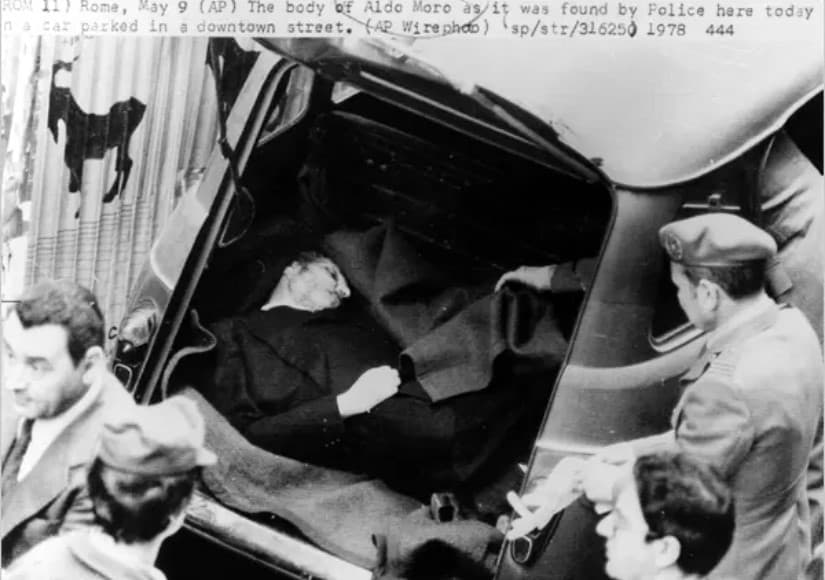ROME – Yesterday in Italy was a day of memory for the victims of terrorism, both domestic and foreign. May 9 was chosen because it was on that date in 1978 that the bullet-ridden body of former Italian Prime Minister Aldo Moro was found in Rome, executed by Italy’s notorious homegrown terrorist movement the Red Brigades.
Moro’s death came after a 55-day captivity, and it traumatized the entire country – including his close friend Giovanni Battista Montini, better known as Pope Paul VI, who personally officiated over the funeral Mass.
For Americans, there’s an aspect to the Moro story which, 45 years later, remains relevant as an element of the cultural gap separating Main Street USA from the Vatican.
As is well known, Paul VI appealed directly to the kidnappers to liberate Moro, and was prepared to go to great lengths to secure his friend’s release.
Archbishop Antonio Mennini, who was the pastor of Moro’s parish at the time of his abduction and who would later go on to become the Vatican’s ambassador to Great Britain, confirmed in testimony before an Italian parliamentary commission in 2015 that Paul VI was prepared to pay a ransom for Moro of roughly 10 billion lira, the equivalent of around $5 million in 1978.
Italian Monsignor Cesare Curioni, at the time the inspector general for prison chaplains in Italy, later revealed that Paul VI had asked him personally to open a line of communication with members of the Red Brigades in order to present the ransom proposal directly. Curioni died in 1996, but his version of events has been confirmed by his secretary, Monsignor Fabio Fabbri, who described taking a large amount of cash to the pope’s summer residence at Castel Gandolfo for payment of the ransom.
In the end the offer came to nothing, because the Red Brigades weren’t interested in money but rather political recognition by the Italian state, as well as the release of several inmates the group regarded as political prisoners. Those demands were refused, eventually leading to Moro’s execution.
Whereas politicians in the United States are fond of saying that “America does not negotiate with terrorists,” the Moro case is a reminder that the Vatican very much does, and always has.
Amid the looting and pillaging that followed the Sack of Rome in 1527, for example, Pope Clement VII was compelled to wall himself up in the Castel Sant’Angelo, and was able to get away only after agreeing to pay a ransom of 400,000 ducats, tantamount to a small fortune in today’s money.
To take a much more recent example, we know that Pope Francis authorized the payment of hundreds of thousands of Euro in 2018 to al Qaida-linked militants in the African nation of Mali in order to secure the freedom of Colombian Sister Gloria Cecilia Narvaez, a missionary who’d been kidnapped by the group in 2017.
During her captivity, al-Qaida in the Islamic Maghreb would occasionally release videos of Narvaez appealing for the Vatican’s help. She was eventually released in 2021.
In March, Venezuelan Archbishop Edgar Peña Parra, effectively the pope’s chief of staff, told a Vatican tribunal that Pope Francis authorized him in 2018 to wire money intended to secure Narvaez’s release to a Slovenian-based front company owned by Cecilia Marogna, a self-styled security analyst who had been enlisted to help free the Colombian nun.
Marogna, who’d been brought into the operation under Peña Parra’s predecessor, Italian Cardinal Angelo Becciu, is now accused of misappropriating some of those funds.
Following the Vatican’s example, church leaders at other levels have adopted the same approach. Bishop Matthew Kukah of Sokoto in northern Nigeria, for example, revealed last September that he’s paid the equivalent of $70,000 to secure the freedom of kidnapped priests, mostly by members of the militant Islamic Boko Haram movement.
Not everyone, naturally, is the of the same mind. Bishops in Cameroon, for example, which is also menaced by Boko Haram, have announced that they won’t pay ransoms.
Yet the Moro and Narvaez cases, and many others, illustrate that the Catholic Church has no blanket position on negotiating with terrorists – and that under at least some circumstances, the Vatican is willing to do whatever it takes, including engaging in talks and paying ransoms, to try to protect its personnel.
To some extent, this is a difference in policy: Opponents of negotiating with terrorists, including the paying of ransoms, believe that doing so simply encourages more terrorism. Supporters contend that a blanket stance of non-engagement makes the safe return of hostages less likely, and radicalizes the situation from the outset.
In truth, neither side in that debate generally is completely consistent. Americans do indeed sometimes negotiate, and the Vatican doesn’t automatically pay off. Nonetheless, there’s also a cultural element to the contrast worth remembering.
Historically, the United States is a Protestant culture heavily conditioned by Calvinist dualism, meaning a sharp distinction between the elect and the reprobate, between good and evil. Catholicism, of course, has fought titanic struggles against dualism over the centuries, including the Gnostics and the Manichaeans well before John Calvin came along.
At the Accademia, the Vatican’s elite school for diplomats, they say that “not every sentence of a heretic is heresy.” The idea is that even an avowed enemy of the faith may still have some truth, and even the most ardent believer can err.
The extent to which one is willing to engage perceived wrong-doers probably reflects this basic cultural difference, even if the influence is indirect and inexact – marking yet another chapter in a much larger story, which is that, in so many ways, America is just from Mars, and the Vatican from Venus.













